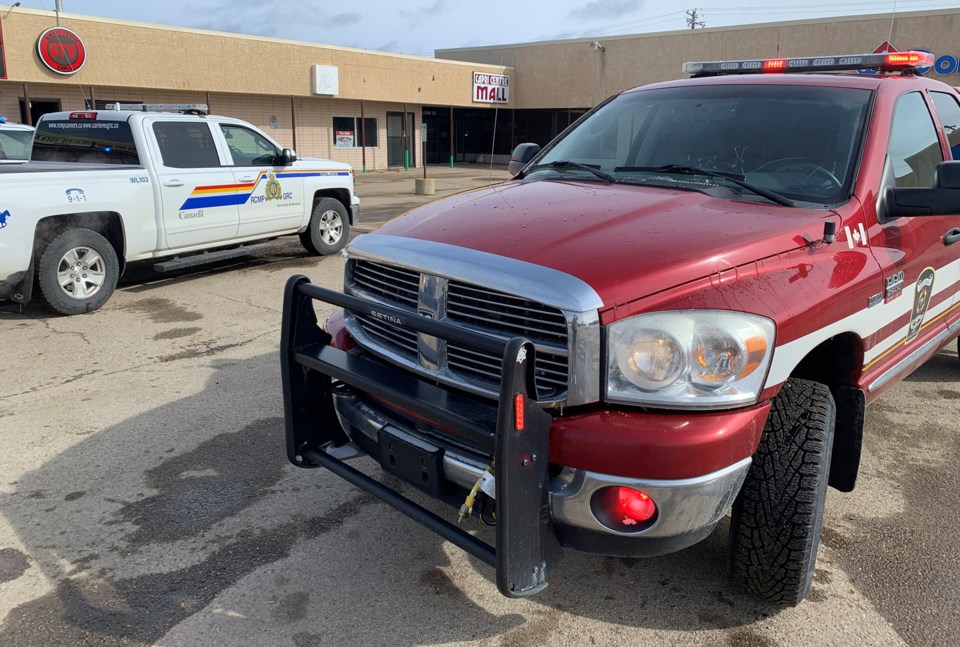WESTLOCK – The Town of Westlock has offered its support and will embark on lobbying efforts to give all of the province’s community peace officers access to RCMP talk groups, encrypted radio channels the Alberta Association of Community Peace Officers (AACPO) says its members need to access to safely do their jobs.
At their June 28 meeting, town councillors voted 7-0 to have administration draft a letter to the justice minister in support of the AACPO’s concerns over the suspension of the RCMP radio talk groups pilot program. In a letter to council, AACPO president Terri Miller wrote that at a May 26 meeting with ‘K’ Division acting commander John Ferguson they were told that although the six-month pilot project that ran in 2020 was a success, it was being suspended due to a staff shortage in the RCMP’s informatic department.
The pilot project allowed Town of Okotoks, County of Grande Prairie, City of Grande Prairie, City of Red Deer, Foothills County and Clearwater County peace officers access to encrypted RCMP talk channels on the Alberta First Responder Radio Communications System (AFRRCS). Currently, the Town of Westlock Fire Department and peace officer are on AFRRCS, but cannot access the RCMP channels — Westlock County did not reply by deadline.
“Unfortunately, this was not the news we were expecting to hear, but the AACPO’s work with the RCMP in ensuring access to RCMP talk groups was successful and we remain excited that the RCMP is committed to the completion of the project,” Miller’s letter reads in part.
“Although we were disappointed by this development, we will continue to work with the RCMP and municipalities to get this project completed.”
The staff shortage justification to suspend the project was a bit of a head scratcher for mayor Ralph Leriger, adding he’ll personally follow up with contacts at ‘K’ Division.
“We’ve met all these individuals and they’ve been sincere in developing a relationship with us, so I’ll reach out to them as well and try to understand this issue and what’s taking so long,” said the mayor.
“I will admit that I don’t quite understand how it takes more staff. They did the pilot project and we didn’t receive a report on it, but we did hear that it was successful and that’s about it. I don’t understand personally why it takes more staff to allow peace officers to use the same radio channel for their safety. We take it seriously and I assume they do as well.”
Miller’s June 17 letter goes on to state that the RCMP assured them that they are committed to the completion of the project and they’ve submitted a request for additional staff and are currently waiting to hear back from the province.
“This is a discussion we’ve had with ‘K’ Division in the past. This is about the safety of our peace officers on the ground and ensuring they had a way to reach enforcement and that they have back-up. At that time it was received very well,” added Coun. Murtaza Jamaly.
RMA has been lobbying since 2019
Community peace officer access to RCMP radio channels became an issue after AFRRCS came online.
Previously, RCMP radio channels could be accessed by peace officers and fire departments, but after the change the RCMP encrypted their frequencies, removing the ability of supporting law-enforcement agencies to communicate with them via AFRRCS.
Westlock RCMP Staff Sgt. Al Baird said that although their channels are restricted, RCMP do have the ability to switch over to a channel and speak with emergency services who are responding to non-police related events.
As to whether CPOs and other emergencies service need access to the RCMP’s channels, Baird said it’s in the hands of the higher ups and “we wait for their decision.”
The issue has previously come up at the Rural Municipalities of Alberta in 2019 when that organization began its lobbying efforts for access.
The RMA backgrounder states the AFRRCS, which was developed and implemented by the province, is a two-way radio network for first responders in municipal, provincial and First Nations agencies and is meant to improve safety and enhance communications.
“However, in some cases the opposite is happening as some agencies protect information to the exclusion of vital partners in serving our communities; two primary examples are Alberta Health Services excluding fire departments, and RCMP excluding community peace officers (CPOs),” reads the RMA’s backgrounder in part.
“With the uptake of AFRRCS underway, problems started to emerge when the RCMP decided to encrypt their radio channels, thereby removing the ability of supporting law-enforcement agencies to communicate with them through AFRRCS. This decision has made radio communication between CPOs and RCMP worse than before AFRRCS, because encryption of radio channels has completely separated agencies from functioning as teams to respond.”
The RMA says the problem affected the delivery of service and safety of CPOs in all rural municipalities, “particularly when rural crime continues to be a major issue.” CPOs are often the “eyes and ears” of rural Alberta, the backgrounder stated, and if CPOs are not aware of RCMP actions, they will not be aware of potentially dangerous situations or know to be on the lookout for suspects and be unable to pass along key information to the RCMP.



